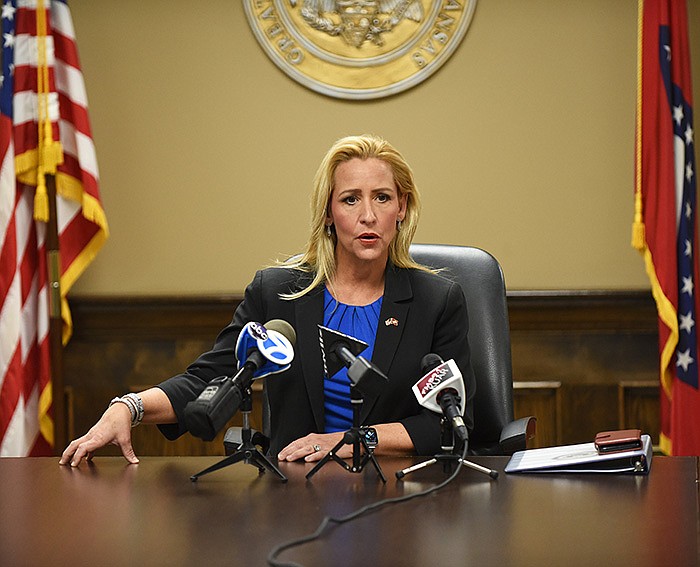Four Arkansas voting laws formally struck down as illegal this week should be allowed to go into effect until the state Supreme Court can decide whether the measures pass constitutional muster, government lawyers argued Thursday.
Pulaski County Circuit Judge Wendell Griffen entered his written findings Thursday, about a week after saying he found the measures to be unconstitutional following a four-day trial earlier this month.
Supporters of the laws described the measures as necessary to strengthen election integrity and improve public confidence in the system. At trial, the government lawyers defending the laws presented no proof to justify them, Griffen wrote, noting that legislators could have testified in support.
Writing further, Griffen said the defendants even acknowledged during the proceedings "that concerns about voter fraud and election insecurity in Arkansas are baseless and fabricated."
"[T]he law does not permit [government] Defendants to rely on conjecture, speculation, surmise, misinformation, and fear-mongering about baseless assertions of voter fraud and election insecurity as substitutes for proof," Griffin wrote. "However, the evidence presented during the trial of this lawsuit demonstrates that [the challenged laws] are based entirely on conjecture, speculation, surmise, misinformation, and fear-mongering about allegations of voter fraud and election insecurity."
Just after Griffen's ruling was entered, Attorney General Leslie Rutledge, the government's lawyer, called on the judge to stay his decision until the Arkansas Supreme Court, the final arbiter on the laws, can review his findings on appeal.
With the May primaries looming, Rutledge warned a last-minute change to the voting laws could confuse election officials and voters.
"Defendants seek appellate review of the orders entered by this court because several important legal issues are implicated here," Rutledge, represented by Assistant Attorney General Kesia Morrison, stated in the motion. "A stay is appropriate and necessary in order to avoid confusion for election officials and voters, and to preserve the status quo pending the outcome of the appeal."
There was no response to the stay request by the end of the courthouse workday on Thursday. A representative of the League did not return an email requesting comment about the request.
Griffen had been tasked to decide the legality of the contested measures by a lawsuit brought by the Arkansas League of Women Voters and immigration advocates Arkansas United, which claimed that the measures are actually intended to keep poor and minority-group residents away from the ballot box or at least restrict their access to voting. Five other plaintiffs were Arkansas senior citizens who said the measures would at least impede their right to vote if not actually prevent them from casting ballots.
The plaintiffs presented testimony from 12 witnesses, including academic and state authorities on election security and voter engagement, while government lawyers presented no evidence to dispute the lawsuit's claims, instead relying on legal arguments that the challenged measures were designed to make elections safer and promote confidence in the balloting process.
At issue were Act 249, involving voter identification; Act 728, regulating campaigning around the polls during voting; Act 736, affecting how ballots are validated; and Act 973, which sets deadlines for mail-in absentee ballots.
Laying out the evidence and laws supporting his decision in 85 pages, Griffen said the plaintiffs proved the measures did more to harm voters than any good the measures might do toward improving the election system.
""[E]ach of the challenged enactments violates provisions of the Arkansas Constitution which guarantee the right to vote," Griffen stated. "Plaintiffs met their burden to prove that Acts 249, 736, and 973 violate the rights of registered Arkansas voters, and that Act 728 violates the right of Arkansans to assemble and offer expressive non-electioneering speech, conduct, comfort within 100 feet of the primary exterior entrance of a polling place.
"Defendants failed to show that Acts 249, 728, 736, and 973 further the compelling governmental interest of preventing fraudulent voting in Arkansas and bolstering public confidence in election security."
The Republican-dominated Legislature passed the contested quartet among 24 election laws. State lawyers told the judge all they had to do to prove the measures are legal is show that they were enacted for a good reason, a "rational basis."
But the judge disagreed, ruling that when the government directly impacts a constitutional right like voting, the government's actions must survive "strict scrutiny" by showing that it has acted in the least restrictive way.
The judge closed his ruling by invoking the Rev. Martin Luther King Jr.'s book, "Strength to Love, "a collection of the assassinated minister's sermons. King was "prescient" to warn against "soft-mindedness" as a "recipe for fascism" in a manner that fits the case, Griffen wrote.
"Few people have the toughness of mind to judge critically and to discern the true from the false, the fact from the fiction. Our minds are constantly being invaded by legions of half truths, prejudices, and false facts," King stated. "We do not need to look far to detect the dangers of softmindedness. Dictators, capitalizing on softmindedness, have led men to acts of barbarity and terror that are unthinkable in civilized society."
The five voter-plaintiffs are Dortha Dunlap, 86 of Springdale; Leon Kaplan, 79, of Little Rock; Nell Matthews Mock, 73, of Little Rock; Jeffery Rust, 69, of Fayetteville; and Patsy Watkins, 74, of Fayetteville.
The defendants are Republican Secretary of State John Thurston and the six-member state Board of Election Commissioners, all Republican appointees, Wendy Brandon, Sharon Brooks, Jamie Clemmer, Belinda Harris-Ritter, William Luther and J. Harmon Smith.
